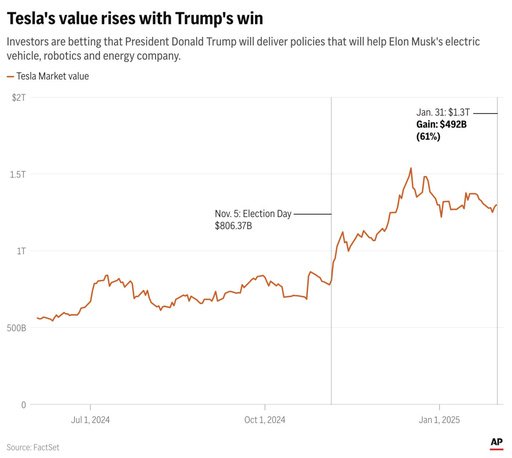NEW YORK — Enthusiasts of Elon Musk are witnessing what can only be described as a monumental gamble of half a trillion dollars. This figure represents the remarkable surge in Tesla’s stock market value since the presidential election and continues to rise, even in the face of a disappointing financial report that would have negatively impacted the shares of almost any other corporation.
Investors are optimistic that President Donald Trump will ultimately benefit Musk’s enterprise, believing his intentions to drastically reduce numerous government regulations and impose tariffs will work in favor of Tesla. The sentiment seems to be that less regulation is a positive, while the potential for a trade conflict raises no significant alarms.
“This seems to herald a golden era for both Tesla and Musk,” stated financial analyst Dan Ives from Wedbush Securities, adding that following an investor conference call, he noted, “I’ve never heard Musk sounds so optimistic.”
Betting on Tesla has always been a risk, with history suggesting that Musk facing an uphill battle to establish a thriving electric vehicle maker. Against all odds, he not only accomplished this but transformed it into the world’s leading automaker, also making him the wealthiest individual globally. However, this latest investment appears particularly precarious. Musk claims the genuine worth of his enterprise lies ahead, involving thousands of Tesla robots expected by year-end and fully autonomous vehicles. He has committed to launching robotaxi services in Austin in June, with plans to expand nationwide by the end of 2023.
The narrative suggests that Trump will accelerate this progress. The president has reportedly given Musk a White House office and assigned him to lead a new Department of Government Efficiency, which aims to streamline operations within the government.
Sean Duffy, the new transportation secretary, is on a similar trajectory, pledging to reduce unnecessary regulations for automakers. He also aims to implement a unified federal framework for self-driving vehicles in place of the confusing array of state regulations that Musk has criticized as detrimental to innovation.
More significantly, Trump has taken a softer approach toward China, a crucial market for Tesla. Instead of implementing the 60% tariffs he previously threatened, Trump is imposing an additional 10% levy on Chinese goods starting Saturday. Nevertheless, the imposition of tariffs on Canada, Mexico, and China caused Tesla’s stock to slough off 5% on Monday, marking a sharper decline than other automotive manufacturers. Chief Financial Officer Vaibhav Taneja acknowledged the potential adverse effects of tariffs since Tesla sources components from across the globe.
Moreover, Trump has made promises that could adversely impact Musk’s business model. He envisions eliminating a $7,500 federal tax incentive that encourages electric vehicle purchases and modifying emission standards, which could jeopardize Tesla’s revenue from selling regulatory credits to other manufacturers who might not meet pollution standards. Tesla earned around $692 million from such credits during the last quarter of 2024, a sizable increase from the previous year, significantly bolstering Tesla’s financial situation.
The future of government investigations into Tesla also remains uncertain. One particular area of scrutiny involves the company’s so-called Full Self-Driving technology, a term that misrepresents the fact that human intervention may still be necessary. The National Traffic Highway Safety Administration initiated several investigations last month following reports of crashes during low-visibility conditions.
Secretary Duffy assured lawmakers at a recent hearing that he would allow these investigations to reach conclusions based on the evidence, promising to resist political pressure to favor Musk, who has positioned himself as a key ally of the president.
As events unfold, Musk will require all possible regulatory concessions and support from Trump. Tesla revealed a decline in sales for 2024, the first occurrence in over a decade, while facing strong competition from BMW, Volkswagen, and China’s BYD all vying for market share. During the latest earnings announcement, Tesla’s revenue and profits failed to meet analysts’ forecasts, yet surprisingly, the stock continued its upward trajectory.
“The events that would generally harm other automakers seem to have little effect on Tesla,” remarked analyst Seth Goldstein of Morningstar.
Besides corporate performance, shareholders must remain vigilant regarding Musk’s political pursuits. Recently, Musk has been vocal against European political figures, actively supporting the far-right Alternative for Germany and condemning British Prime Minister Keir Starmer as an “evil tyrant.” In the U.S., Musk’s actions on Inauguration Day, which were interpreted by many as reminiscent of Nazi gestures, attracted significant backlash.
“How many potential Tesla customers share Musk’s opinions?” questioned Felipe Munoz, an analyst at Jato Dynamics. “It seems counterproductive to alienate potential buyers.”
Potential European regulators may also be deterred by Musk’s comments, as he awaits approval for the Full Self-Driving technology. A loss of investor confidence in Musk could lead to significant declines for the company.
The increase in Tesla’s stock value alone since the elections surpasses the annual economic output of 160 nations. Its market valuation has reached approximately $1.3 trillion, eclipsing the combined worth of industry giants like General Motors, BMW, Ford, Ferrari, and Porsche.
Musk envisions an even brighter future, asserting that Tesla’s stock could reach astonishing heights. “I see a realistic pathway for Tesla to emerge as the world’s most valuable company—far beyond its competitors,” Musk stated, reiterating his optimism for the company’s valuation to exceed that of the next five largest firms combined.
Currently, Tesla ranks as the seventh most valuable firm in the S&P 500. Ives from Wedbush emphasizes that this is just the beginning, believing the potential for growth will only increase from this point forward.
“The wager Musk placed on Trump could redefine the market,” he reflected. “Musk is set to create a monumental influence on deregulation, which could net staggering returns.”



